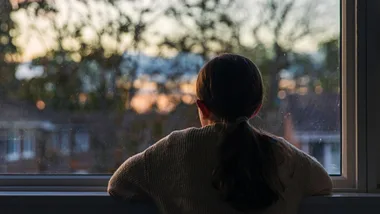Studies show that resilience, more than any other trait, is the key to a healthy mind and body.
When writer Emma Markezic was diagnosed with Grade 3 breast cancer at age 34, her first reaction was to buy silk pyjamas.
“I knew I’d be going into hospital and thought it was a good excuse to splurge. That was after I got astonishingly drunk, of course,” remembers Emma. “You can’t predict how you’ll react to these things until they happen and I went full throttle on the things I know best: red wine and ASOS.”
For a lot of cancer patients, the phrase “my world turned upside down” comes to mind when they talk about their diagnosis. But, for Emma, those words didn’t ring true. She admits it wasn’t her best day, but what she thought when the doctor told her it was cancer was, “I can do this.”
“That was it … ‘I can do it,’” she recalls. “I made sure I didn’t waver from that outlook at all.”
It was a mantra she stuck to throughout the next year, even during three painful operations, including a double mastectomy and breast reconstruction; even when her boyfriend broke up with her just before she began chemotherapy and even when her hair fell out on her birthday.
“These were all things I couldn’t change. Seeing my hair in the drain was the least of my worries,” says Emma. “However, I realised pretty quickly that the people around me clearly expected a full-frontal breakdown. And all I had was this overriding feeling of quaking fortitude.”
COPING WITH ADVERSITY
It’s this unwavering strength in the face of adversity that defines the concept of resilience, and research shows that resilient people are able to cope better with challenges than those who are not.
But how can you quantify resilience in yourself and how do you know how you’d react to a situation like Emma’s?
Neuroscientist Dr Sarah McKay, author of The Women’s Brain Book, explains resilience as “bending like bamboo, rather than breaking like a twig in the face of a stressful event”. Not being able to ignore or deflect challenges but bed down and bounce back afterwards.
“Resilience is a buzzword right now, but there is scientific proof of its importance to our health,” says Dr McKay. “And as for where it comes from, we know that resilience can be partly shaped by innate characteristics we are born with and partly shaped by our family life, community, society and those social structures we have around us.”
MEASURING RESILIENCE
One of the ways health professionals measure resilience is by looking at the “health outcomes” around stressful life events. Specifically, how people’s health suffers (or doesn’t) during and after a challenging time. This is especially relevant for women, because we are statistically more prone to anxiety and depression, and are more likely to develop post-traumatic stress disorder.
The good news, though, is that resilience can be built in adults using some clear, evidence-based strategies that can be implemented easily.
“We live in a 24/7 society,” says Dr McKay. “But I think it’s important to respect the fact that humans evolved biologically on Earth, so we should be respecting the light/dark cycles for sleep. We evolved on foot and now we sit all day at our desks. These health basics, which ultimately help build resilience, are lost in our modern world.”
FRIENDSHIP MATTERS
One of the most important steps for building up resilience, according to Dr McKay, is making a concerted effort to establish strong social networks with like-minded friends who will be there to support you.
“We certainly don’t grow up in the world alone. It’s not a life about ‘me’, it’s a life about ‘we’,” explains Dr McKay. “And sometimes it just takes that one person who is there for you – no matter what – to make all the difference.”
For Emma, the value of her friendships became more important throughout the long months of cancer treatment and recovery.
“I leant on my friends more heavily that I had in my whole life,” she recalls. “I now know that this is something successful and resilient people do a lot – they’re not too proud to ask for help or admit that they need cheering up … That was a lesson I learnt firsthand from the belly of an incredibly bad situation.”
LIFE LESSONS
However, despite our efforts and our social network, sometimes you only really know how you’ll cope once something big occurs. And you might just be surprised by how well you react.
When the worst happened to Emma, she found out that she was far more emotionally elastic than she realised. “There were less tears than I expected, though I did indulge in some, obviously,” she recalls. “But I didn’t shake my fist at the universe – not once … I think you just have to make the most of what life throws at you. And it will throw a lot. Life doesn’t get easier, you just get stronger.”
How To Build Resilience
Dr Sarah Mckay recommends a five-step approach:
1. Improve Your Health
Focus on the basics, such as getting decent sleep at night when it’s dark, looking after your diet with good, healthy natural food, and moving every day.
2. Seek out challenges
By being put to the test in smaller ways (facing fears, learning new skills), we build up resources we can draw on later.
3. Accept the situation
Recognise that sometimes external stressful events happen and we can only control how we react to them.
4. Learn your moods
Be able to name and manage your thought patterns, moods and emotions, so they don’t adversely affect your mental health.
5. Reach out
Ask for help. Having other people in our lives supporting us and loving us is the greatest buffer for stress that we encounter.










